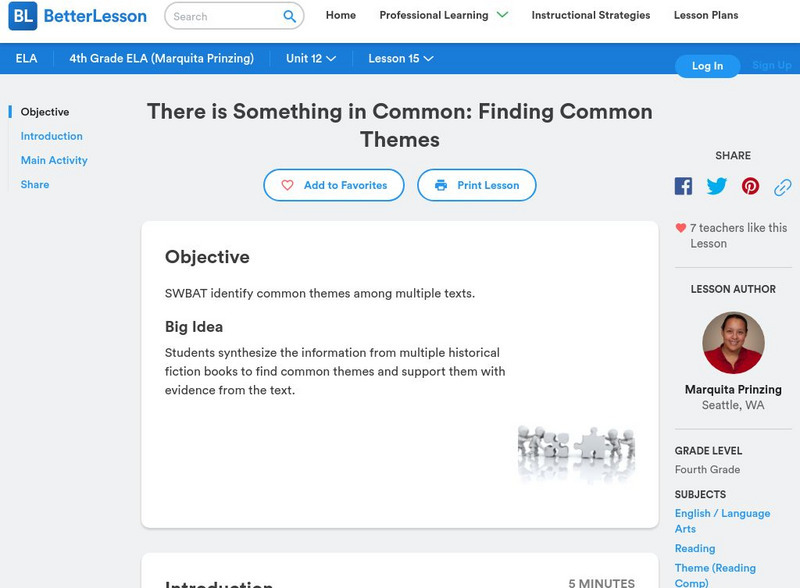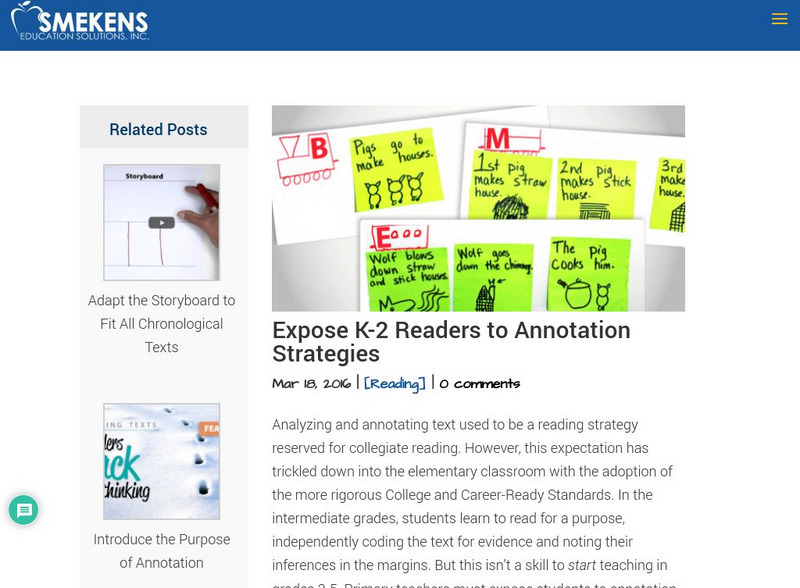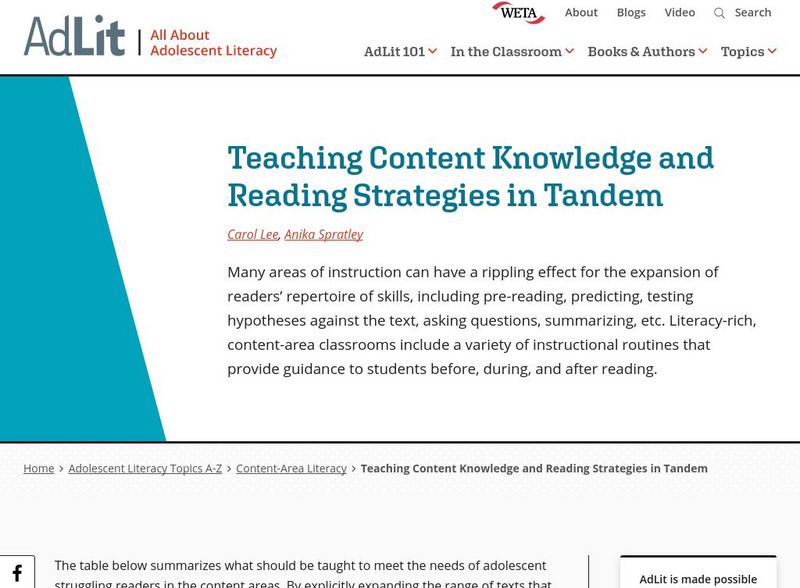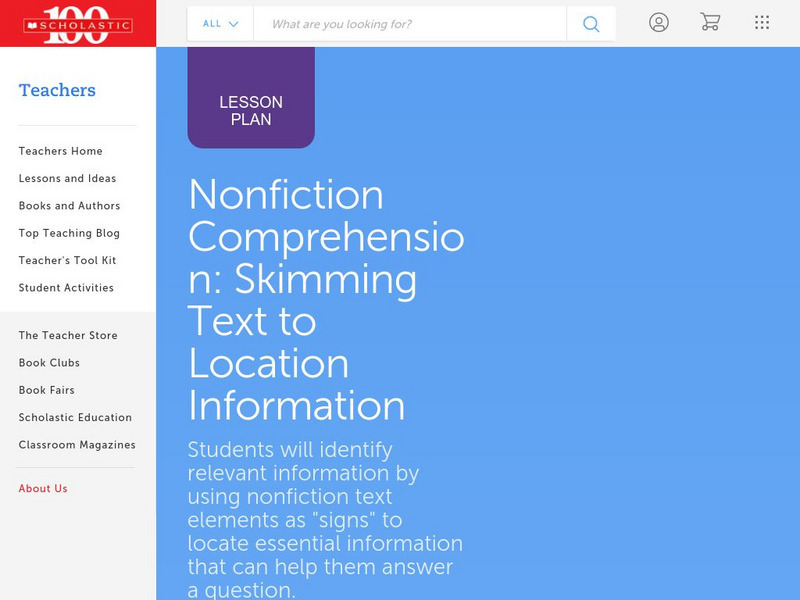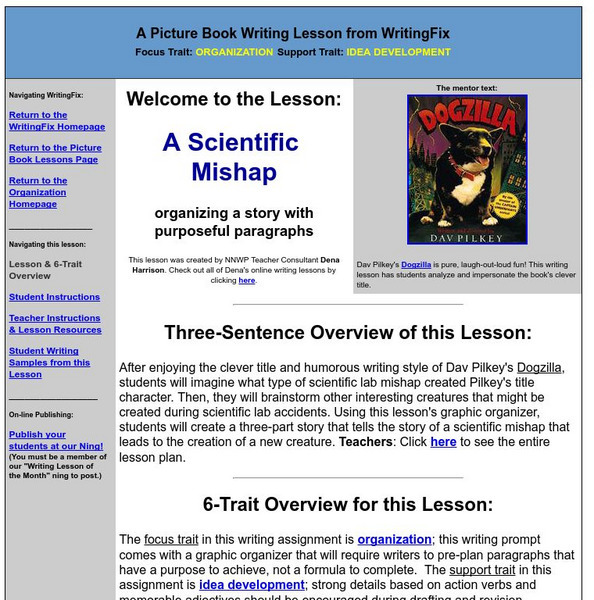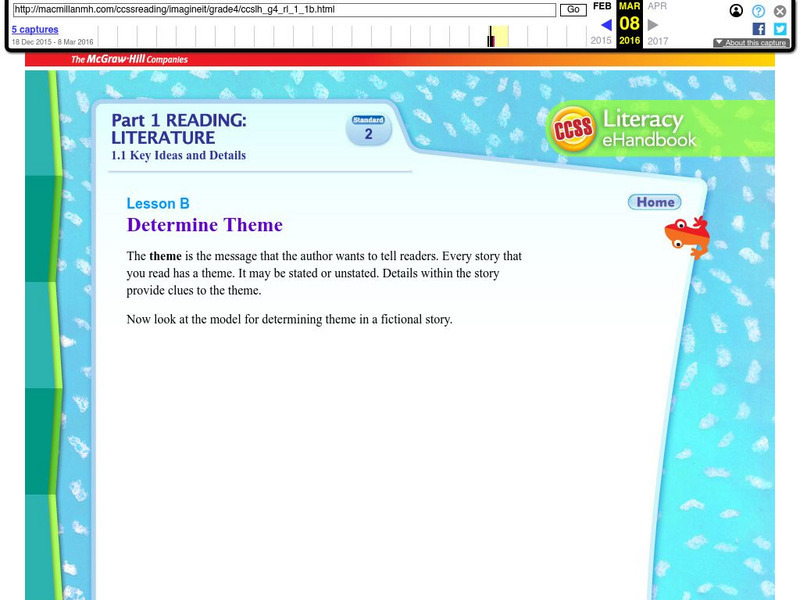CommonLit
Common Lit: "What Is an Eclipse?" by Nasa
CommonLit.org is a wonderful resource to use in a Language Arts classroom. Each story or article is accompanied by guided reading questions, assessment questions, and discussion questions. In addition, students can click on words to see...
Texas Education Agency
Texas Gateway: Describe Themes in Literary Texts (English 7 Reading)
[Accessible by TX Educators. Free Registration/Login Required] This lesson is about themes, the central messages in literature. Whatever their genre might be, writers have some wisdom, some universal truth or insight to share; this...
Texas Education Agency
Texas Gateway: Analyze Thesis, Purpose, Textual Elements in Informational Text
[Accessible by TX Educators. Free Registration/Login Required] This lesson focuses on how to locate the controlling idea or thesis and specific purpose in a text and analyze the roles they play in understanding what you read. You will...
Texas Education Agency
Texas Gateway: Explain the Controlling Idea, Purpose, and Distinguish Details
[Accessible by TX Educators. Free Registration/Login Required] In this lesson, students will learn how to pinpoint the controlling idea, which not only identifies the main idea, but also answers questions about the author's goal or...
Better Lesson
Better Lesson: There Is Something in Common: Finding Common Themes
Young scholars will synthesize information from multiple historical fiction books to find common themes and support them with evidence from the text. Working with a partner who has read a different book, they will share their theme from...
Texas Education Agency
Texas Gateway: Synthesize Ideas and Details in Several Texts (English I Reading)
In this lesson, you will practice making connections between ideas on the same topic. Some of the ideas will differ from each other, so we will learn how to identify and synthesize important details and draw conclusions. W.9-10.7 Research
Association for Supervision and Curriculum Development (ASCD)
Ascd: Building Literacy in Social Studies: Ch 1: Reading Social Studies Texts
Article provides excellent tips and strategies for building comprehension and critical thinking skills in Social Studies. It describes some of the challenges students have with reading and understanding their textbooks.
Better Lesson
Better Lesson: Visual Representations in Informational Text
Students will look at examples of illustrations and diagrams in informational texts and discuss how each one helps enhance the text. Students gain the knowledge that sometimes a picture is worth a thousand words because a complex idea...
Better Lesson
Better Lesson: A Storm of Ideas
The first step in writing an informational text on the topic of students' choice is helping the student choose a topic of interest. Students will brainstorm ideas that will be possible final topics.
Other
Smekens Educational Solutions: Expose K 2 Readers to Annotation Strategies
This article discusses how to begin teaching students in K-2 to record their ideas about text using highlighters, colored pens, large graphic organizers, and sticky notes. Students can retell a story with a storyboard, use a web to find...
Thinkport Education
Thinkport: Read Like This: Determining Theme in Literary Texts
In this module you will read a story called "The New Dress" by Virginia Woolf, with the purpose of determining themes and how they develop over the course of the text.
Texas Education Agency
Texas Gateway: Write Expository Text That Synthesizes Ideas
[Accessible by TX Educators. Free Registration/Login Required] A learning module that teaches students how to bring ideas together in an expository text in four lessons: Introduction, Analyzing Our Sources, Pulling Out the Major Points...
Michigan State University
Michigan State University: Intervention for Reading: Summarization Strategy
Improve understanding of expository materials by summarizing the main ideas. The summarization strategy helps students recall the main ideas and specific facts of materials they read. There are five rules for writing summaries.
Curated OER
Neh: Edsit Ement: Walt Whitman's Notebooks and Poetry: The Sweep of the Universe
For this lesson plan, young scholars will consider "Walt Whitman's Notebooks and Poetry: The Sweep of the Universe." The plan includes worksheets and other student materials that can be found under the resource tab.
AdLit
Ad lit.org: Teaching Content Knowledge and Reading Strategies in Tandem
Many areas of instruction can have a rippling effect for the expansion of readers' repertoire of skills, including pre-reading, predicting, testing hypotheses against the text, asking questions, summarizing, etc. Literacy-rich,...
Scholastic
Scholastic: Lesson Plan for Nonfiction Comprehension: Skimming Text
Build comprehension by developing reading strategies for use with nonfiction text. This lesson focuses on teaching students to recognize text elements as clues to help them quickly locate key information in text.
Writing Fix
Writing Fix: Organizing a Story With Purposeful Paragraphs
In this instructional activity, learners organize and design a narrative based on three developing ideas.
McGraw Hill
Mc Graw Hill: Part 1 Reading: Literature: Determine Theme
Learn how to determine a theme of a story on this site. Click on model at the bottom right and continue through lesson.
E Reading Worksheets
E Reading Worksheets: Summarizing Worksheets and Activities
In this instructional resource, students will learn more about summarizing texts. Worksheets and PowerPoint lessons are provided to reinforce understanding about ways to summarize nonfiction texts and to identify main ideas. This module...
Wisconsin Response to Intervention Center
Wisconsin Rt I Center: Text Dependent Questions [Pdf]
Describes a reading strategy where students must respond to text by supporting their ideas with text-based evidence. Lists different categories of questions the teacher can prepare based on the text chosen, with examples for each.
Cambridge Rindge & Latin School
Cambridge Rindge & Latin School: Research Topic Ideas
A comprehensive and in-depth list of possible topics and ideas for research papers from the Cambridge Rindge and Latin School.
Curated OER
Mc Graw Hill: Part 2 Reading: Determine Main Idea and Supporting Details
Use this example to see if you understand how to pick out the main idea and supporting details to that main idea.
Curated OER
Mc Graw Hill: Part 2 Reading: Determine Main Idea and Supporting Details
A reference article for students to learn about how to determine the main idea and supporting details from the text. Click on the Model for an example with explanation and then click on Practice for a practice exercise.
Curated OER
Mc Graw Hill: Part 2 Reading: Informational Text: Summarize
Learn how to summarize a text based on the main idea and supporting details you found.






